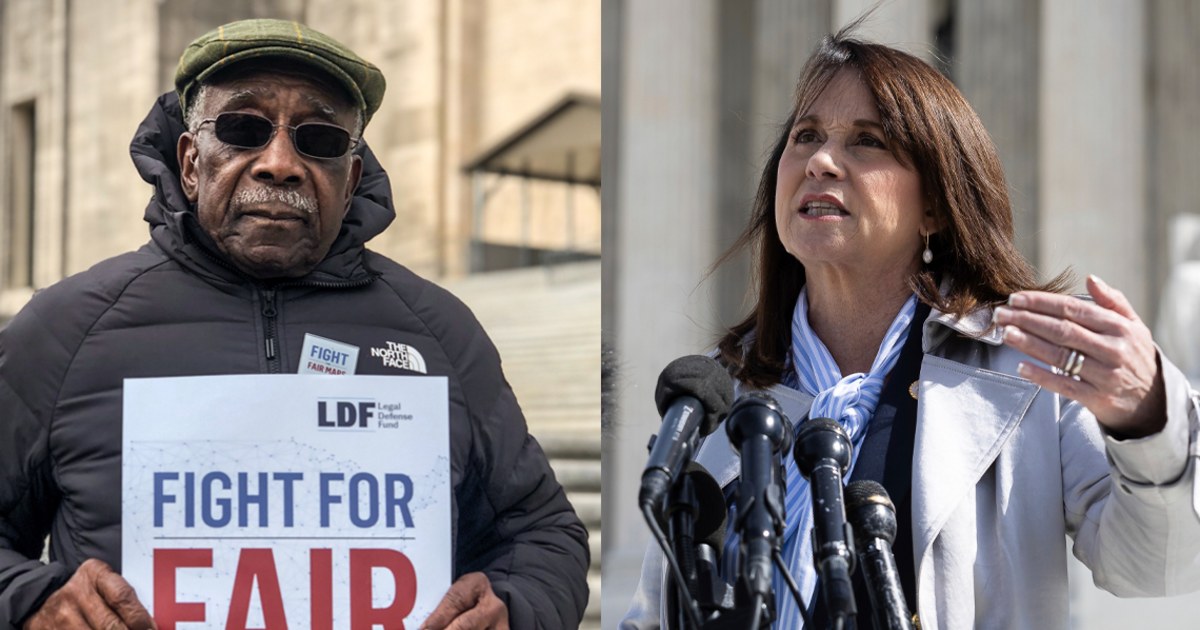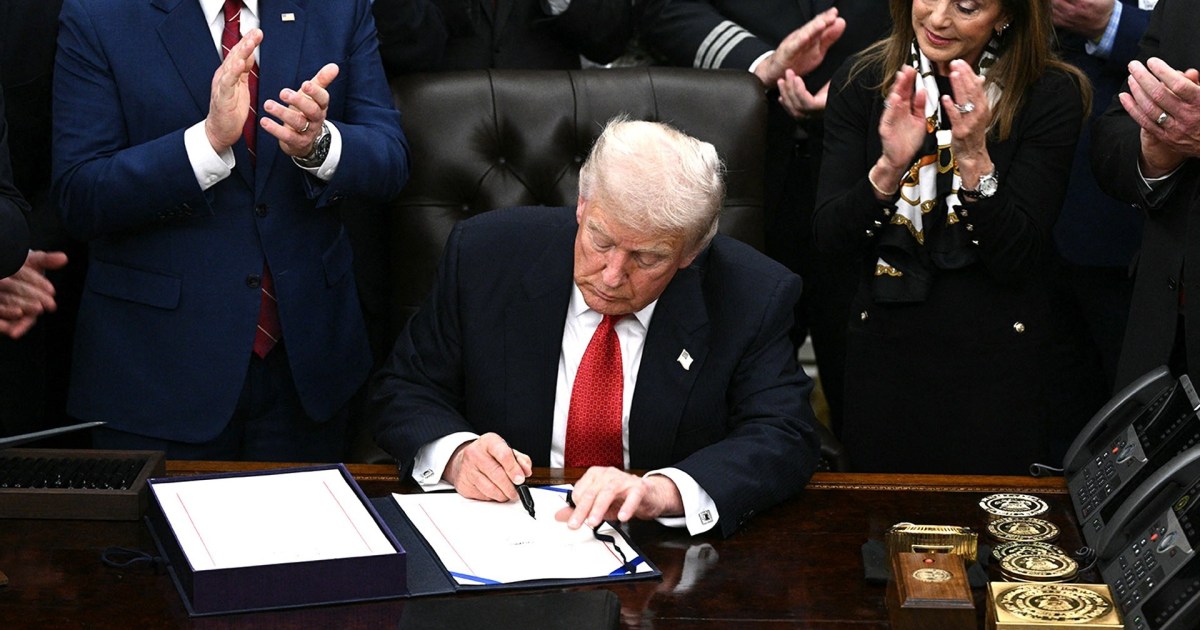The Supreme Court’s conservative majority could use the Louisiana redistricting case to further weaken the landmark Voting Rights Act.
Source link
Oct. 12, 2025, 5:00 AM EDTBy Lawrence HurleyWASHINGTON — The way Louisiana’s Republican leaders put it, the pervasive racial discrimination in elections that led to the passage of the 1965 Voting Rights Act is all in the past.That is why they are now urging the Supreme Court, in a case being argued on Wednesday, to bar states from using any consideration of race when drawing legislative districts, gutting a key plank of the law that was designed to ensure Black voters would have a chance of electing their preferred candidates.Louisiana Attorney General Liz Murrill told NBC News that the Voting Rights Act was designed to address blatantly discriminatory policies and practices that prevented Black people and other minorities from voting decades ago.“I think the question now is, have we gotten to a point where those obstacles really don’t exist anymore?” she said. “I don’t think they exist in Louisiana,” she added.At issue is a congressional district map that Louisiana grudgingly redrew last year after being sued under the Voting Rights Act to ensure that there were two majority-Black districts. The original map only had one in a state where a third of the population is Black, according to the U.S. census.The state’s new legal argument, which may appeal to a conservative-majority Supreme Court, is that drawing a map to ensure majority-Black districts violates the Constitution’s 14th and 15th Amendments, which were both enacted after the Civil War to ensure former slaves had equal rights under the law, including the right to vote.Supreme Court appears skeptical of LGBTQ conversion therapy bans04:02Conservatives say those amendments bar any consideration of race at any time, and the Supreme Court has previously embraced this “colorblind” interpretation of the Constitution.Civil rights activists say that approach makes a mockery of both the post-Civil War amendments and the Voting Rights Act, not to mention their experience on the ground in Louisiana.Press Robinson, who is one of the plaintiffs who challenged Louisiana’s original congressional map, said he had to sue in 1974 just so he could take his place as an elected official on the East Baton Rouge Parish School Board.“Has Louisiana really changed? I don’t see it,” he told reporters on a recent call.The issue reaches the court, which has a 6-3 conservative majority, just two years after it surprisingly rejected a similar bid to weaken the Voting Rights Act in another redistricting case.The court, however, has struck blows against the law in other rulings in 2013 and 2021.In the 2023 case, the court rejected a Republican-drawn congressional map in Alabama on the grounds that it discriminated against Black voters, leading to a new map being drawn that included two majority-Black districts.The vote was 5-4, with two conservatives, Chief Justice John Roberts and Justice Brett Kavanaugh, joining the court’s three liberals in the majority. Four other conservatives dissented.In Wednesday’s oral argument, Kavanaugh will be a focus of attention, in part because of what he said in his separate concurring opinion in the Alabama case.Although Kavanaugh voted with the majority, he expressed some sympathy for the argument that even if race could at one point be considered as a factor in ensuring compliance with the Voting Rights Act, it no longer can be.But, he added, “Alabama did not raise that temporal argument in this Court, and I therefore would not consider it at this time.”Now, piggybacking on Kavanaugh’s opinion, Louisiana’s lawyers eagerly embrace the argument Alabama did not make.Among other things, Louisiana points to the court’s 2023 ruling that ended the consideration of race in college admissions, which was issued just three weeks after the Alabama voting rights ruling.Chris Kieser, a lawyer at the right-leaning Pacific Legal Foundation, which supports Louisiana in the case, said in an interview that the upshot of a ruling in the state’s favor is that there could be no obligation to ever intentionally draw majority-Black districts.“Districts should not be drawn based on the expected race of the — whoever is going to be the member of Congress representing it,” he said.That could lead to a decline in the number of legislators at the national and state level who are Black or Latino.In that scenario, minority voters would still be able to bring separate racial gerrymandering claims under the Constitution if there is obvious racial discrimination, Kieser argued, although such cases are difficult to win.Depending on what the court does, the provision of the Voting Rights Act in question, known as Section 2, could survive in limited form.A ruling that leads to a reduction in majority-Black and other minority districts would have a partisan impact that could favor Republicans, as Black voters historically favor Democrats. If the court rules quickly, there is even a chance that new maps could be drawn ahead of the hotly contested 2026 midterm elections.The case has a convoluted history, arising from litigation over the earlier map drawn by the state Legislature after the 2020 census that included one Black-majority district out of the state’s six districts.The state drew the current map in order to comply with that ruling, but was then sued by a group of self-identified “non-African American” voters who argued that in seeking to comply with the Voting Rights Act, the state had violated the Constitution.The Supreme Court originally heard the current case earlier this year on a narrower set of legal issues but, in an unusual move, asked in June for the parties to reargue it. Over the summer, the court then raised the stakes by asking the lawyers to focus on the constitutional issue.As a result of that complicated background, the various briefs filed in the case — including one submitted by the Trump administration in support of Louisiana — make a number of different legal arguments.That makes it difficult to know ahead of Wednesday’s oral argument what the justices will focus on, said Sophia Lin Lakin, a lawyer at the American Civil Liberties Union who is part of the legal team defending the latest Louisiana map.“It is so strange. Normally, we would always understand the question we are trying to answer,” she said.Lin Lakin does not think the case should be used as the vehicle for a “full-on assault” on the Voting Rights Act.But, she conceded, “there is some risk the way that’s being presented that the court may be interested in that bigger question.”Lawrence HurleyLawrence Hurley is a senior Supreme Court reporter for NBC News.




